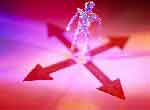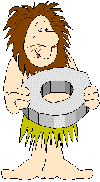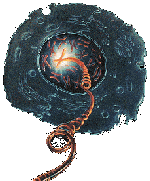|
Intelligence & Conciousness |

The intrinsic definitions of intelligence and consciousness are changing fast.
Today, with personal computer tools and connection to the vast knowledge base of the Internet, traditional tests of knowledge and intelligence are virtually obsolete. As you read this, you don't really know whether I can spell properly or write grammatically correct language because my word-processing program has automatically corrected my spelling errors and grammar. Similarly, my knowledge and experience on virtually any subject are supplemented by Internet access.
Although I am an electronics engineer and have never been to medical school, I've gained a level of fame as a medical consultant among friends and acquaintances. (I won't say doctor, because I never claim to be one). Recently, a friend complained that his toe-nails had developed some kind of fungus. He thought this was athlete's foot; but after almost a year it seemed to persist and had indeed worsened on some toes. I looked this up on the Internet and quickly found that what he had was onychomycosis or nail fungus, something totally different from athlete's foot fungus. There were several ways to tackle the problem, which I suggested. He was cured. In yet another demonstration of my vast medical knowledge, the doctor of an ailing acquaintance that I had helped called personally to thank me for suggesting that the problem was ocular pemphigoid, something she had never previously heard of.
The point I am making is this: just as an inexpensive calculator endows a middle-school junior with the math capability of a savant, an internet connection represents an extension of human capabilities that provides vast power and knowledge to the user. Evolution has taken a step forward.
Medical advances have already succeeded in extending the normal span of human life to almost a century, through consistent conquering of disease. Fifty years ago, my grandfather looked old and feeble at 60. Today, the retirement age of 65 is absurd, as active life in developed countries extends to 75 and beyond. Within the next decade, the ground rules for retirement will change drastically, causing significant social upheaval.
With new biotech tools, the process of aging is itself under intense investigation. In the absence of disease, why do humans age? Someone will inevitably discover that tiny ingredient of human DNA which is depleted when cells split in the growth process and which, when replenished, will eliminate, and even reverse, the aging process. So, what are the implications of human life expectancy of 250 or 500 years? Who will choose to die? And who will choose who will live?
The new millennium brings with it enormous changes in all areas of human consciousness. Perhaps we will enter the era of trans-human, or even post-human existence. In all spheres of consciousness - social, philosophical, spiritual - we must begin to consider the ramifications and prepare for them
If you enjoyed this essay,here are some web-links to material you might enjoy :

|
Return to Index of all JimPinto Writings

 Return to JimPinto.com HomePage
Return to JimPinto.com HomePage
If you have ideas or suggestions to improve this site, contact: webmaster@jimpinto.com
Copyright 2000 : Jim Pinto, San Diego, CA, USA

 Seriously, I have given equally amazing demonstrations as a biochemist, an archeologist, and an entomologist. My primary tool for demonstrations of my power is an Internet connection and one of many excellent search engines. Within a couple of years, I won't even be tied to my desk - I'll have a fast wireless connection with the PDA in my pocket.
Seriously, I have given equally amazing demonstrations as a biochemist, an archeologist, and an entomologist. My primary tool for demonstrations of my power is an Internet connection and one of many excellent search engines. Within a couple of years, I won't even be tied to my desk - I'll have a fast wireless connection with the PDA in my pocket.
 Before you think I am being too grandiose, consider this. Evolution is survival of the fittest - Homo sapiens with a tool survived while the equivalent, sans tool, did not. The development of tools continually extended human powers through the agricultural and industrial revolutions until today, when we have developed vast computational capability combined with instant worldwide communications and connectivity. Evolution moves exponentially. The developments of the last century have dwarfed progress of the past millennium, and have themselves been exceeded by those of the last decade.
Before you think I am being too grandiose, consider this. Evolution is survival of the fittest - Homo sapiens with a tool survived while the equivalent, sans tool, did not. The development of tools continually extended human powers through the agricultural and industrial revolutions until today, when we have developed vast computational capability combined with instant worldwide communications and connectivity. Evolution moves exponentially. The developments of the last century have dwarfed progress of the past millennium, and have themselves been exceeded by those of the last decade.
 After the discovery of DNA, the Human Genome Project was launched to construct detailed genetic and physical maps of the human genome. This will determine the complete nucleotide sequence of human DNA and localize the estimated 100,000 human genes, to help determine their individual effects and functions. This twenty year international research program is expected to be complete within a couple of years and heralds the start of amazing new progress in the biotech arena. This is just at the start of the new millennium. Where will it lead?
After the discovery of DNA, the Human Genome Project was launched to construct detailed genetic and physical maps of the human genome. This will determine the complete nucleotide sequence of human DNA and localize the estimated 100,000 human genes, to help determine their individual effects and functions. This twenty year international research program is expected to be complete within a couple of years and heralds the start of amazing new progress in the biotech arena. This is just at the start of the new millennium. Where will it lead?
 Today human cloning is banned. But we must recognize, without naivete, that there are countless bioengineers racing to see who will be first to clone a human being. And when the process is perfected (perhaps in a hundred years, perhaps less) will humans still prefer the painful, and by then antiquated, natural birth process?
Today human cloning is banned. But we must recognize, without naivete, that there are countless bioengineers racing to see who will be first to clone a human being. And when the process is perfected (perhaps in a hundred years, perhaps less) will humans still prefer the painful, and by then antiquated, natural birth process?
 It has been estimated that synthetic intelligence will exceed that of humans within about 30 years. At what stage will a machine have an independent legal identity to protect its life, liberty and pursuit of happiness? As the development of artificial body-parts advances to the replacement of whole human segments, perhaps even the brain, at what stage will the human identity cease and the machine identity commence? If I can download my entire consciousness to a machine and my physical body shows inferior characteristics (aches and pains), at what stage will I choose to survive in synthetic form and discard the organic original? And, when the organic body is shut down, what are the social, moral, legal and theological implications? Will my synthetic being maintain my legal status? And, will God wait to judge me until my machine consciousness has eventually been terminated?
It has been estimated that synthetic intelligence will exceed that of humans within about 30 years. At what stage will a machine have an independent legal identity to protect its life, liberty and pursuit of happiness? As the development of artificial body-parts advances to the replacement of whole human segments, perhaps even the brain, at what stage will the human identity cease and the machine identity commence? If I can download my entire consciousness to a machine and my physical body shows inferior characteristics (aches and pains), at what stage will I choose to survive in synthetic form and discard the organic original? And, when the organic body is shut down, what are the social, moral, legal and theological implications? Will my synthetic being maintain my legal status? And, will God wait to judge me until my machine consciousness has eventually been terminated?